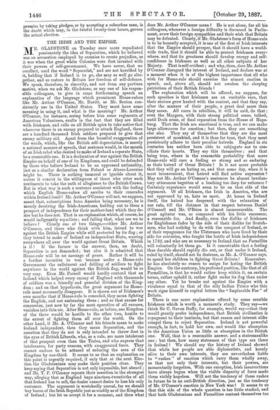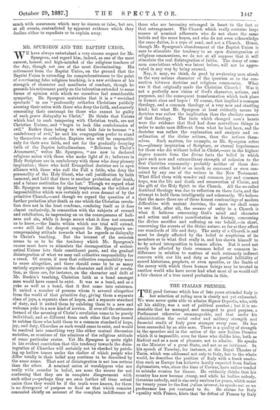THE IRISH AND THE EMPIRE.
MR. GLADSTONE on Taesday once more repudiated passionately the idea of Separation, which he believed was an accusation employed by enemies to create prejudice, as it was when the great white Colonies were first invested with their powers of self-government. We have never, that we recollect, used the word "Separatist," and are not horrified by it, holding that if Ireland is to go, she may as well go alto- gether, and so restore to Britain her freedom of self-defence. We speak, therefore, in sincerity, and not from any partisan motive, when we ask Mr. Gladstone, or any one of his respon- sible colleagues, to give in some forthcoming speech an explanation of the language which prominent Home-rulers like Mr. Arthur O'Connor, Mr. Davitt, or Mr. Sexton con- sistently use in the United States. They must have some meaning in using it, and what is the meaning? Mr. Arthur O'Connor, for instance, seeing before him some regiments of American Volunteers, exalts in the fact that they are filled with Irishmen, and calls on all British spies to take notice that wherever there is an enemy prepared to attack England, there are a hundred thousand Irish soldiers prepared to give that enemy military aid. Apart from the boastful exaggeration of the words, which, like the British self' depreciation, is merely a national manner of speech, that sentence would, in the mouth of an Irish rebel who desired to make of Ireland a separate State, be a reasonable one. It is a declaration of war against the British Empire on behalf of one of its Kingdoms, and could be defended by those who believe Ireland to be an oppressed nationality, just as a similar declaration from Poland or Alsace-Lorraine might be. There is nothing immoral or ignoble about it, unless it consist in the willingness of those who utter each sentiments to take the oath of allegiance to the British Crown. But in what way is such a sentence consistent with the feeling which English Home-rulers all ascribe to their comrades within Ireland itself? Mr. Arthur O'Connor will not, we suppose, assert that, subscriptions from America being necessary, he is merely deceiving the Irish-Americans, holding out to them a prospect of independence for their mother-land which they de- sire but he does not. That is an explanation which, of course, he would indignantly repudiate ; and failing that, what are we to believe ? Clearly one of two things,—either Mr. Arthur O'Connor, and those who think with him, intend to war against the British Empire while still protected by its flag ; or they intend to make of Ireland an independent State, warring everywhere all over the world against Great Britain. Which is it ? If the former is the answer, then, no doubt, Separation is not demanded ; but also it is admitted that Home-rule will be no message of peace. Rather it will be a further incentive to war, because under a Home-rule Government the enlistment and drilling of soldiers to fight anywhere in the world against the British flag, would be so very easy. Even Mr. Parnell would hardly contend that an Ireland which helped every enemy of England with thousands of soldiers was a friendly and peaceful division of the King- dom; and on that hypothesis, the great argument for Home- rule must necessarily disappear. It is shown out of Irishmen's own mouths that if Home-rule is conceded, they mean fighting the English, and not embracing them ; and so that excuse for concession, just now by far the most operative of all excuses, vanishes into thin air. After Home-rule, as before, one Kingdom of the three would be hostile to the other two, hostile to the extent of fighting them all over the world. On the other hand, if Mr. A. O'Connor and his friends mean to make Ireland independent, then they mean Separation, and the assertion that they do not is only intended to throw dust in the eyes of British Liberals, who, as a rule, are more intolerant of that prospect even than the Tories, and who express that intolerance, for party reasons, with exaggerated force. They cannot endure to be aubused of reducing the area of the Kingdom by one-third. It seems to us that an explanation on this point is urgently required, if only that at the next Elec- tion the Gladstonians may make their position clear. They keep saying that Separation is not only impossible, but absurd ; and Mr. T. P. O'Connor repeats their assertion in the strongest way, alleging that as England buys nineteen-twentieths of all that Ireland has to sell, the dealer cannot desire to lose his only customer. The argument is wretchedly unreal, for we should buy bacon of the Irish Republic just as readily as of the Kingdom of Ireland ; but let us accept it for a moment, and then what
does Mr. Arthur O'Connor mean? He is not alone, for all his colleagues, whenever a foreign difficulty is discussed in Parlia- ment, avow their foreign sympathies and their wish that Britain may be defeated. Clearly, if Mr. Gladstone's form of Home-rule is to be honestly accepted, it is one of the first of Irish interests that the Empire should prosper, that it should have a world- wide trade, that it should be able to protect Irishmen every- where, and that its greatness should develop energy and self- confidence in Irishmen as well as all other subjects of her Majesty. That is self-evident; and why, then, does Mr. Arthur O'Connor disregard the interest of Ireland, and declare war at a moment when it is of the highest importance that all who wish for Home-rule should exercise the utmost caution in speech, and, above all, should not awaken the sleeping patriotism of their British friends ?
The explanation which will be offered, we suppose, for such speeches is that Irishmen are an excitable race, that their orators grow heated with the contest, and that they say, after the manner of their people, a great deal more than they mean. All races in rebellion, it will be said, do that ; even the Maygars, with their strong political sense, talked, until Detik arose, of final separation from the House of Haps- burg. That the Irish are emotional is true, and we can make large allowances for emotion ; but then, they are something else also. They say of themselves that they are the most persistent of mankind, and it is thus far true, that they most persistently adhere to their peculiar hatreds. England in six centuries has neither been able to subjugate nor to con- ciliate their hearts. They say this themselves ; and that being true, where is the reasonable probability that mere Home-rule will cure a feeling so strong and so enduring as their hatred of Great Britain ? Is it not more probable that they will go on hating us, and that some day, when it is most inconvenient, that hatred will find active expression ? May not Mr. Arthur O'Connor's sentences be almost involun- tary utterances begotten of a loathing too deep for reticence ? Certainly experience would seem to be on that side of the argument. Of all Irishmen, the Irish in America, who are not oppressed by us, hate us most. At home in Ireland itself, the hatred has deepened with the relaxation of our rule, till the distance in that respect between Daniel O'Connell and Mr. O'Brien is almost immeasurable. The great agitator was, as compared with his little successor, a reasonable foe. And finally, even the dislike of Irishmen for Englishmen fades by the side of their dislike for Scotch- men, who had nothing to do with the conquest of Ireland, or of their repugnance for the Ulstermen who have lived by their side for centuries, who fought the battle of Irish independence in 1782, and who are so necessary to Ireland.that no Parnellite will voluntarily let them go. Is it conceivable that a feeling thus durable should rapidly die out, or that under it Ireland, ruled by itself, should not be desirous, as Mr. A. O'Connor says, to spend her children in fighting Great Britain? Remember, he has absolutely no reason to assign for hating the British Empire. On the contrary, his professed position, like that of all Parnellites, is that he would rather keep within it, on certain terms, rather uphold it, rather fight under its flag than under any other. Yet he breaks out against the Empire with a virulence equal to that of the silly Indian Prince who this week signs himself in capital letters the "Implacable Foe" of Britain.
There is one more explanation offered by some sensible Irishmen which is worth a moment's study. They say—we think Sir 0. Gavan Duffy, for example, would say—that they would greatly prefer independence, that British civilisation is repugnant to their instincts, but that reason and interest alike compel them to reject Separation. Ireland is not powerful enough, in fact, to hold her own, and would like absorption in the American Union as little as absorption in the British one. Well, that is a reasonable answer, and a statesmanlike one ; but then, how many statesmen of that type are there in Ireland We should say the history of Ireland showed that while her people are able diplomatists, and keenly alive to their own interests, they are nevertheless liable to " rushes " of emotion which carry them wholly away, so that not only their interests, but their powers, are momentarily forgotten. With one exception, Irish insurrections have always began when the visible disparity of force made them visibly hopeless. Will not the tendency of these rushes in future be in an anti-British direction, just as the tendency of Mr. O'Connor's emotion in New York was ? It seems to us that this side of the whole question is too little studied, and that both Gladstonians and Parnellites content themselves too much with assurances which may be sincere or false, but are, at all events, contradicted by apparent evidence which they decline either to repudiate or to explain away.



































 Previous page
Previous page